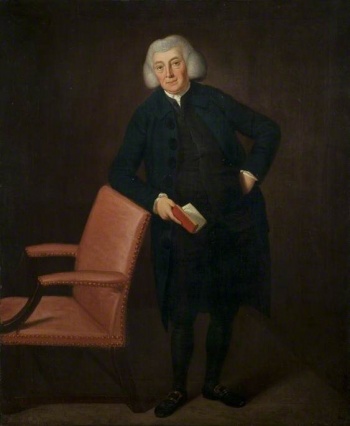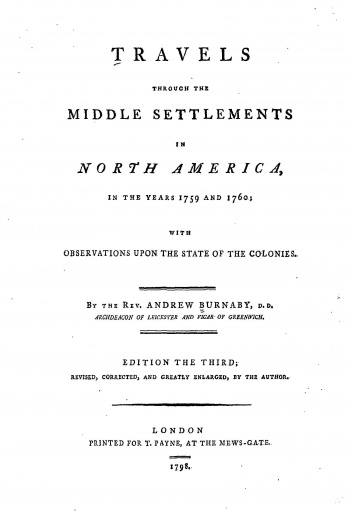Travels through the Middle Settlements in North America

Andrew Burnaby (1732 – 1812) was an English clergyman, ordained in 1756, who later became the Archdeacon of Leicester, and Vicar of Greenwich. In 1759, he toured the British colonies in America, publishing a popular travelogue, Travels through the Middle Settlements in North America, in the Years 1759 and 1760: With Observations upon the State of the Colonies, in 1775. In 1798 a third edition of the book, "revised, corrected, and greatly enlarged," was published.[1]
The new edition contains a footnote which mentions "George Wyth," in reference to the character of the inhabitants of the Virginia colony. Barnaby implies that Wythe is exceptional among Virginians, touts his many virtues, and is perhaps the first to relate the story that it was Wythe's mother who taught him to read and write classical Greek at a young age.
In 1922, Barnaby's tribute to Wythe was brought to the attention of the Society of the Sons of the Revolution in Virginia, in an article for the Sons of the Revolution in State of Virginia Quarterly Magazine.[2]
Text from the 3rd edition, 1798
Page 24n
‡ General characters are always liable to many exceptions. In Virginia, I have had the pleasure to know several gentlemen adorned with many virtues and accomplishments, to whom the following description is by no means applicable. Amongst others, I cannot resist the inclination of mentioning George Wyth [sic] Esquire, who, to a perfect knowledge of the Greek language, which was taught him by his mother in the back woods, and of theancient,
Page 25n
ancient, particularly the Platonic philosophy, had joined such a profound reverence for the Supreme Being, such respect for the divine laws, such philanthropy for mankind, such simplicity of manners, and such inflexible rectitude and integrity of principle, as would have dignified a Roman senator, even in the most virtuous times of the republic.—This gentleman is, I believe, still living.
See also
References
- ↑ Andrew Burnaby, Travels through the Middle Settlements in North America, in the Years 1759 and 1760: With Observations upon the State of the Colonies (London: T. Payne, 1798).
- ↑ R.B. Munford, Jr., "An Englishman's Tribute to Chancellor Wythe," Sons of the Revolution in State of Virginia Quarterly Magazine 1, no. 2 (April 1922), 39.
External links
- Read this book at Hathitrust.
- Read this book at the Internet Archive.

